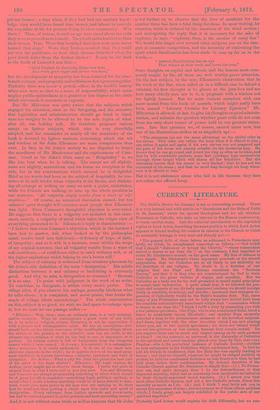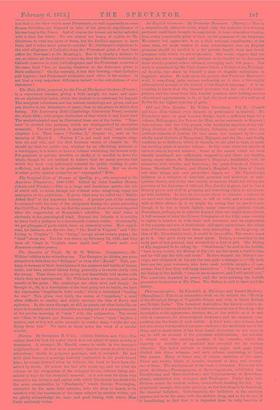CURRENT LITERATURE.
The Dublin Review for January is not so interesting as usuaL There is a very learned and solid article on "Gnosticism and the Rule of Faith in St. Irenasus," which for special theologians and for all, whether Protestant or Catholic, who take an interest in the Roman controversy, is worth careful study. And the editorial introduction to tlie reprinted replies to Lord Acton, describing the exact position to which Lord Acton appears to intend leading his readers in relation to the Church to which he nominally belongs, is very neat and sharply put :—
" The general drift of these letters as addressed to Protestants may
fairly, we think, be paraphrased somewhat as follows God forbid that I should "dishonour or betray the Church," "whose communion indeed is dearer to me than life "; on the contrary, I feel impelled to resist Mr. Gladstone's assault on her good name. My line of defence is very simple. Mr. Gladstone's whole argument proceeds on the absurd supposition, that we Catholics are at all likely to act faithfully on the doctrines of our religion. No doubt it is a doctrine of our religion that the Pope and Bishops constitute the " Ecclesia Docens," and that it is they who are commissioned by God to train Catholics in the great verities of dogma and morality. But we Catholics as a body are far too well grounded in sound moral principles to accept their instruction. I quite admit that, if we followed the pre- cepts and counsels of our divinely-appointed teachers, we should indulge freely in rebellion, treachery, and murder; insomuch that stringent re- pression of Catholicity would be the State's bounden duty. Nay, since many of you Protestants may not be fully aware how fearful have been the scandals authoritatively sanctioned within that "communion which is dearer to use than life," I think I fulfil a duty by presenting you with a few pattern specimens. One Pope, who is also a canonised Saint, hired a bravo to assassinate Queen Elizabeth; and another Pope earnestly exhorted a king to the promiscuous massacre of his heretical subjects. And these, together with the other atrocities which I am now placing before you, are at last merely specimens ; for there are 'others which are not less grievous or less certain, because they remain untold.' Do you suppose there can be much real respect among us for such persons as these ? On the contrary, so universal is the disloyalty of Catholics to the spiritual and moral teachers placed over them by God, that even Fenelon—who is the proverbial instance of Catholic docility—yielded no true submission to the Definition which condemned him. In fact he told his friends in confidence, that the Holy See was rapidly tending to heresy ; and that for himself, whatever he might be obliged publicly to profess, he held his condemned doctrines no less firmly now than he had held them before their condemnation. My defence therefore of the Catholic Church against Mr. Gladstone is simply this :—(1.) No Protes- tant can feel more strongly than I do the detestableness of that depraved morality, which has so constantly been inculcated on Catholics by their divinely-appointed moral teachers. (2.) I assure you that most other Catholic laymen, and not a few Catholic priests, detest this morality as much as I do. (3.) And I think I may fairly ask you to accept this assurance of mine ; and not suspect us of those odious qualities which, I freely grant, are largely exhibited in the public acts of our spiritual superiors."
Probably Lord Acton would explain his drift differently, but we con-
less that is the view which most Protestants, as well apparently as some Roman Catholics, are disposed to take of the general significance of his teaching in the TimPs. And of course the former are better satisfied with it than the latter. We are almost too weary of replies to Mr. Gladstone to read any more of them, but the Dublin's appears to have force, and it takes more pains to consider Mr. Gladstone's objections to the civil allegiance of Catholics from the Protestant point of view than either Dr. Newman's or Dr. Manning's. But it is clearly a mistake to say, as almost all the Catholic writers do, that the difference between the Catholic reserves to their civil allegiance and the Protestant reserves of the same kind "has no bearing whatever on the deference given to State authority." On the contrary, it has this bearing,—that Catholics pull together, and Protestants neutralise each other in the matter. Is not that a very important difference indeed in the calculations of wise statesmen ?



































 Previous page
Previous page